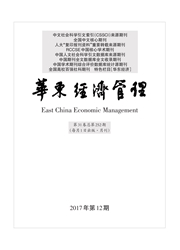

 中文摘要:
中文摘要:
文章以2000-2012年安徽省16个地级市的面板数据为基础,通过构建实证计量模型,研究了不同金融发展评价指标对安徽省人口城镇化与土地城镇化发展协调度的作用,结果发现:较高的金融发展水平有助于提高人口城镇化速度,改善城镇化发展失衡的局面;银行对民营经济发展提供的信贷支持能够促进人口城镇化水平的提高;政府对银行信贷资金的占有会导致人口城镇化滞后于土地城镇化;对农村的金融抑制不利于城镇化发展失衡问题的改善.针对上述研究结论,提出了相应的对策建议.
 英文摘要:
英文摘要:
Based on the panel data of 16 cities at prefecture-level in Anhui province during the year of 2000 to 2012,thepaper constructs an empirical econometric model to study the impacts of different evaluation indexes of financial develop.ment on the development coordination degree of population urbanization and land urbanization in Anhui province. The re.sults show that: the higher level of financial development will help to increase the ratio of population urbanization and im.prove the imbalance of urbanization development; the bank credit support on the development of the private economy cancontribute to improve the level of population urbanization; the government possession of bank credit funds will lead to popu.lation urbanization lagging behind land urbanization; the rural financial repression is not conducive to the improvement of ur.banization development imbalance. Finally,the paper puts forward the corresponding countermeasures in accordance withthe conclusions of the study.
 同期刊论文项目
同期刊论文项目
 同项目期刊论文
同项目期刊论文
 期刊信息
期刊信息
